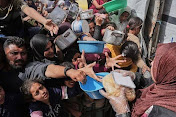The hearings come in response to a resolution passed last
year by the UN General Assembly asking the ICJ to weigh in on Israel's legal
responsibilities after the country blocked UNRWA, the UN agency for Palestinian
refugees, from operating on its territory.
The hearings opened as the humanitarian aid system in Gaza
is nearing collapse. The UN legal team was the first to address the court on
Monday, followed by Palestinian representatives.
The World Food Program said last week its food stocks in
Gaza have run out, ending a main source of sustenance for hundreds of thousands
of Palestinians.
Israel, which denies deliberately targeting civilians and
aid staff as part of its war with Hamas, has blocked the entry of food, fuel,
medicine and other supplies since 02 March, and renewed its military campaign
on March 18, saying it aims to push Hamas to release more hostages.
The Palestinian Ambassador to the Netherlands Ammar Hijazi
told the ICJ in The Hague, “Israel is starving, killing and displacing
Palestinians while also targeting and blocking humanitarian organizations
trying to save their lives", accusing it of breaching international law.
No
Israeli representatives attended the hearing, which Foreign Minister Gideon
Saar decried as part of a “systematic persecution and delegitimization” of his
country. "It is abusing the international legal system and politicizing
it," he added.
Israel's ban on UNRWA, which came into effect in January,
stems from claims that the group has been infiltrated by Hamas. Israel
presented its case against UNRWA on Monday, accusing it of failing to act
before the war against evidence that Hamas had used its facilities.
Amir Weissbrod, a Foreign Ministry official, said UNRWA
employed 1,400 Palestinians with militant ties, adding that some of those
employees also took part in Hamas’ 07 October 2023 attacks. UNRWA said it fired
nine staffers after an internal UN investigation.
In total, 40 states and four international organizations are
scheduled to participate in the ICJ case. The US, which voted against the UN
resolution, is scheduled to speak on Wednesday.
The court will likely take months to rule. But experts say
that while any decision will not be legally binding, the outcome could
profoundly impact international jurisprudence, international aid to Israel and
public opinion.
Whether
any ruling will have an effect on Israel is another matter. The Israeli
government has long accused the UN of being unfairly biased against it and has
ignored a 2004 advisory ruling by the ICJ that found its West Bank separation
barrier illegal.
It also
ignored last year's advisory ruling calling Israel to stop settlement activity
in Jerusalem and the occupied West Bank, with Israeli Prime Minister Benjamin
Netanyahu calling it a "decision of lies".




